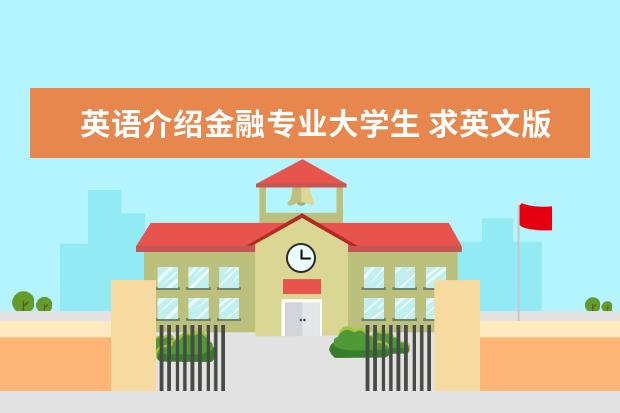今天蜕变学习网小编整理了经济学大学专业介绍英文 求英文版自我介绍财务管理专业,希望在这方面能够更好的帮助到考生及家长。
求英文版自我介绍财务管理专业
Good morning!My name is XX. It is my great honor to be here for this interview. I graduated from xx University. The deeper knowledge I have mined during undergraduate studies, the more interested I am in Finance.
早上好! 我的名字 叫XX。我很荣幸能来参加这次面试。我毕业于XX大学粗陵。我在本科学习中挖掘的知识越深,我对金融越感兴趣。
During my sophomore year and junior year in college, I had passed the tests of xx and xx and got the qualifications separately. For a more targeted learning, I choose your honorable school to further my professional knowledge.
在大学二、三年级期间,我分别通过了XX和XX的考试并获得了 资格证书 。为了更具针对性的学习,我选择了贵校,以加深我的专业知识。
I had organized many activities, for example: xx and xx when I was an undergraduate student. During these activities, I was mainly responsible for logistics and budget because I am prudent. I am also good at logical thinking and have a solid foundation of math, so I choose to start the second degree of them. In my spare time, I also read some articles about Accounting and Finance.They’re all very useful and helpful for my study.
我组织了很多活动,例如:当我还是大学生的时候,我组织了XX和XX。在这些活动中,我主要负责后勤和预算,因为我很谨慎。我也擅长 逻辑思维 ,有扎实的数学基础,所以我选择从第二级开始。在业余时间,我还阅读了一些有关会计和财务的文章,这些文章对我的学习很有帮助。
If I am enrolled, I will spare no efforts to acquire knowledge and improve myself; if not, which means I have more reasons to strengthen myself.
如果我被录取了,我将不遗余力地学习知识和提高自己;如果指改没有,这意味着我有更多的理由来加强自己。
That is my self-introduction, and thanks for your time again!
这是我的自我介绍,再次感谢您的光临!
以上是财务管理或者 会计学专业 应届毕业生的英语自我介绍的范例,文章在惯常的学习和实践情况基础上,增加了自己学习这个专业的优势:岩逗戚逻辑思维强,数学好,以及对专业前沿问题的关注。
经济学专业包括哪些课程?

经济学基础、中级 微观经济学 、中级宏观经济学、 政治经济学 、财政学、国际经济学、金融经济学、计量经济学、公司理财、经济史、当代中国经济、劳动经济学、产业经济学、网络经济学、 会计激毕学 、统计学、国际贸易、国际金融、
企业经济学、会计统计与核算。
拓展资料
经济学专业 是(包括经济学方向和投资经济方向)为适应我国 市场经济 发展需要而设立的一个理论兼应用型本科专业。
该专业培养具备比脊轿较扎实的经济学理论基础,熟悉现代经济学理论,比较熟练地掌握现代经济分析方法,知识面较宽,具有向经济学相关领域扩展渗透的能力,能在综合经济管理部门、政策研究部门,金融机构和企业从事经济分析、预测、规划明野芹和经济管理工作的高级专门人才。
参考资料: 百度百科-经济学专业
商务英语专业的详细介绍

商务英语是以满足职场需求为目的,内容涵盖商务活动全过程,它以语言为载体,把核心的商巧档务内容放到裤兆其中,以职场人员和即将迈入职场的人员为目标,以商务活动中常用英语为重点的一种培训。商务英语的特点主要在于其教学的专业化、口语化和较强的针对性。
专业课程有:综合英语,英语听力、口语、泛读、写作教程,剑桥国际商务英语,国际贸易中、英文版,商务英语写作,商务视听,营销英语。
选修课:报关实务教程,英美报刊选读,心理健康教育,文学欣赏,英语语法等。
此外还有一些公共课程,如:计算机,毛邓三理论,经济学,经济应用写作等等。
想要了解更多关于商务英语的相关信息,推荐咨询美联英语。胡宽租美联英语可以随时预习复习、了解自己的进度情况,测评及报告分析。提供英语培训,英语口语培训,商务英语口语培训,零基础英语培训,学英语上英语学习网站。 【免费领取英语试听课】
随便一个经济学家的英文介绍

(David Ricardo, 1772-1823)
The brilliant British economist David Ricardo was one of the most important figures in the development of economic theory. He articulated and rigorously formulated the "Classical" system of political economy. The legacy of Ricardo dominated economic thinking throughout the 19th Century.
David Ricardo's family was descended from Iberian Jews who had fled to Holland during a wave of persecutions in the early 18th Century. His father, a stockbroker, emigrated to England shortly before Ricardo's birth in 1772. David Ricardo was his third son (out of seventeen!).
At the age of fourteen, after a brief schooling in Holland, Ricardo's father employed him full-time at the London Stock Exchange, where he quickly acquired a knack for the trade. At 21, Ricardo broke with his family and his orthodox Jewish faith when he decided to marry a Quaker. However, with the assistance of acquaintances and on the strength of his already considerable reputation in the City of London, Ricardo managed to set up his own business as a dealer in government securities. He became immensely rich in a very short while. In 1814, at the age of 41, finding himself "sufficiently rich to satisfy all my desires and the reasonable desires of all those about me" (Letter to Mill, 1815), Ricardo retired from city business, bought the estate of Gatcomb Park and set himself up as a country gentleman.
Egged on by his good friend James Mill, Ricardo got himself elected into the British parliament in 1819 as an independent representing a borough in Ireland, which he served up to his death in 1823. In parliament, he was primarily interested in the currency and commercial questions of the day, such as the repayment of public debt, capital taxation and the repeal of the Corn Laws. (cf. Thomas Moore's poems on Cash, Corn and Catholics)
Ricardo's interest in economics was sparked by a chance reading of Adam Smith's Wealth of Nations (1776) when he was in his late twenties. Bright and talkative, Ricardo discussed his own economic ideas with his friends, notably James Mill. But it was only after the persistent urging of the eager Mill that Ricardo actually decided to write them down. He began in 1809, authoring newspaper articles on currency questions which drew him into the great Bullionist Controversy that was raging at the time In that affair, he was a partisan of the Bullionist position, which argued for the resumption of the convertibility of paper money into gold. He wrote a pair of tracts (1810, 1811) articulating their arguments and outlining what has since become known as the "classical approach" to the theory of money.
In these very same tracts, Ricardo also suggested the impossibility of a "general glut" -- an excess supply of all goods -- in an economy. This provoked the Rev. Thomas Robert Malthus to respond to Ricardo. The course of this debate continued in their extensive correspondence with each other, culminating in a series of notes Ricardo wrote on Malthus's 1820 Principles (these were later published posthumously as Notes on Malthus). Ricardo stood firm in his support of Say's Law and di*issed Malthus's underconsumption thesis as theoretically impossible. Yet, in spite of their disagreements on economic doctrines, they took to each other personally and fostered a legendary friendship. Ricardo even passed on investment tips to Malthus -- the most famous case being when Ricardo urged Malthus to invest in the bond market in anticipation of a British victory at Waterloo. Ever the conservative parson, Malthus declined. Ricardo, as usual, made a killing.
In 1815, Ricardo published his groundbreaking Essay on..Profits. There he introduced the differential theory of rent and the "law of diminishing returns" to land cultivation. Coincidentally, this principle was discovered simultaneously and independently by Malthus, Robert Torrens and Edward West. (more astoundingly, all of them published their tracts within three weeks in February, 1815!) In his 1815 Essay, Ricardo formulated his theory of distribution in a one-commodity ("corn") economy. With wages at their "natural" level, Ricardo argued that rate of profit and rents were determined residually in the agricultural sector. He then used the concept of arbitrage to claim that the agricultural profit and wage rates would be equal to the counterparts in industrial sectors. With this theory, he could show that a rise in wages did not lead to higher prices, but merely lowered profits.
Arguably, a proper theory of value was missing in the 1815 tract. In a one-commodity model, this is not an big issue. But, prodded on by Malthus's critici*s, Ricardo realized that in a multiple-commodity economy, for rents and profits to remain residuals, then prices must be pinned down somewhere. In his formidable treatise, Principles of Political Economy and Taxation (1817), Ricardo finally articulated and integrated a theory of value into his theory of distribution.
For Ricardo, the appropriate theory was the "labor-embodied" theory of value or LTV, i.e. the argument that the relative "natural" prices of commodities are determined by the relative hours of labor expended in their production. Indeed, he began his 1817 book by criticizing Adam Smith's alternatives -- the "labor-commanded" and "adding up" theories of value -- because, he argued, that made value a function of wages and thus income distribution. For Ricardo, this was untenable. In his vision, value was independent of distribution, and thus only the "labor-embodied" theory made sense.
However, Ricardo realized that when the question of capital comes in, a problem arose: specifically, as different industries apply different amounts of capital per laborer, then the rate of profit will also differ across industries. Ricardo understood that if he then assumed that the rates of profit across different industries were equalized (as free competition would imply), then, mathematically, relative prices would now vary with wages -- exactly what he had criticized Smith for! Ricardo realized that the labor theory of value would only work if the degree of capital-intensity was the same across all sectors, casting doubt on the generality of his cherished theory.
Ricardo proposed two ways out of this dilemma. The first was the empirical argument that firms apply capital in a roughly proportional manner to the amount of labor invested. In this case, the resulting prices when profits are equalized would not differ much from the values implied by the LTV. This is what Stigler (1958) has called Ricardo's "93% labor theory of value". The second solution was to find a commodity which has the average capital per worker, so that its price would reflect labor-embodied value and thus not vary with changes in distribution. He called this the "invariable standard of value" . If one can find what this "standard" commodity is, Ricardo argued, then the rest of the *ysis is simple. One can, say, change technology, trace the change in value of the standard commodity, and then extrapolate the change in value for all other commodities by the degree to which their capital composition deviates from this standard. Despite his search, Ricardo never found this standard commodity. On his death, an incomplete paper entitled "The Invariable Standard of Value" was found on his desk. Eventually, Karl Marx (1867) proposed one way out of it, but the proper solution would have to wait until Piero Sraffa (1960).
A little tripped up on value, Ricardo (1817) pressed on nonetheless. With prices (more or less) pinned down by the LTV, he restated his old theory of distribution. Dividing the economy into classes of landowners (who spend their rental income on luxuries), workers (who spend their wage income on necessities) and capitalists (who save most of their profit income and reinvest it), Ricardo argued showed once again how the size of profits is determined residually by the extent of cultivation on land and the historically-given real wage. He then added on a theory of growth. Specifically, with profits determined in the manner given above, then the amount of capitalist saving, accumulation and labor demand growth could also be deduced. This, in turn, would increase population and thus bring more land, of less and less quality, into cultivation. As the economy continued to grow, then, by his theory of distribution, profits would be eventually squeezed out by rents and wages. In the limit, Ricardo argued, a "stationary state" would be reached where capitalists will be making near-zero profits and no further accumulation would occur.
Ricardo suggested two things which might hold this law of diminishing returns at bay and keep accumulation going at least for a while: technical progress and foreign trade. On technical progress, Ricardo was ambivalent. One the one hand, he recognized that technical improvements would help push the marginal product of land cultivation upwards and thus allow for more growth. But, in his famous Chapter 31 "On Machinery" (added in 1821 to the third edition of his Principles), he noted that technical progress requires the introduction of labor-saving machinery. This is costly to purchase and install, and so will reduce the wages fund. In this case, either wages must fall or workers must be fired. Some of these unemployed workers may be mopped up by the greater amount of accumulation that the extra profits will permit, but it might not be enough. A pool of unemployed might remain, placing downward pressure and wages and leading to the general misery of the working classes. Technical progress, for Ricardo, was not a many-splendored thing.
On foreign trade, Ricardo set forth his famous theory of comparative advantage. Using his famous example of two nations (Portugal and England) and two commodities (wine and cloth), Ricardo argued that trade would be beneficial even if Portugal held an absolute cost advantage over England in both commodities. Ricardo's argument was that there are gains from trade if each nation specializes completely in the production of the good in which it has a "comparative" cost advantage in producing, and then trades with the other nation for the other good. Notice that the differences in initial position mean that the labor theory of value is not assumed to hold across countries -- as it should be, Ricardo argued, because factors, particularly labor, are not mobile across borders. As far as growth is concerned, foreign trade may promote further accumulation and growth if wage goods (not luxuries) are imported at a lower price than they cost domestically -- thereby leading to a lowering of the real wage and a rise in profits. But the main effect, Ricardo noted, is that overall income levels would rise in both nations regardless.
With his 1817 treatise, Ricardo took economics to an unprecedented degree of theoretical sophistication. He formalized the Classical system more clearly and consistently than anyone before had done. For his efforts, he acquired a substantial following in Great Britain and elsewhere -- what became known as the "Classical" or "Ricardian" School. His system, however, was improved very little by his disciples. Perhaps only John Stuart Mill (1848) and Karl Marx (1867-94) added insights of any great weight.
Ricardo's theory gradually fell out of favor, and died a slow death soon after the Marginalist Revolution of 1871-74. But research continued in some corners of the world, e.g. Vladimir Dmitriev (1898). Only much later did Piero Sraffa (1960) finally solve the "invariable measure of value" problem and re-ignited interest in Ricardo's theory. The "Neo-Ricardian" research program continues to advance today.
以上,就是蜕变学习网小编给大家带来的经济学大学专业介绍英文 求英文版自我介绍财务管理专业全部内容,希望对大家有所帮助!
免责声明:文章内容来自网络,如有侵权请及时联系删除。
本文标题:经济学大学专业介绍英文 求英文版自我介绍财务管理专业
wap地址: https://m.tbqqq.com/zixun/346283.html



















